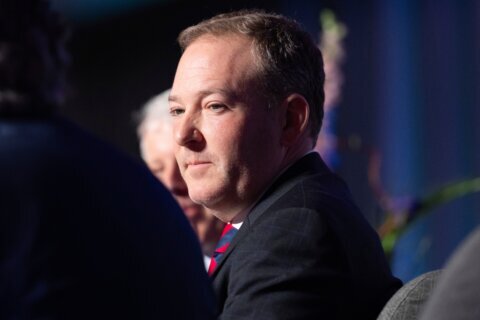NEW YORK (AP) — President Donald Trump was quick to declare “TOTAL VICTORY” after a New York appeals court threw out a civil fraud penalty that stood to cost him more than a half-billion dollars.
But Thursday’s ruling overturning the key punishment in New York Attorney General Letitia James’ lawsuit isn’t the last word. James, a Democrat, has vowed to appeal to the state’s highest court.
Trump still faces other punishments as a result of the lawsuit — including a ban on him and his two eldest sons holding corporate leadership positions for a few years — and could appeal in an attempt to get those reversed.
Here’s a look at how the court ruled and what’s next:
Appeals court ruled the fines were excessive
A five-judge panel of New York’s mid-level Appellate Division overturned Trump’s whopping monetary penalty while narrowly endorsing a lower court’s finding that he, his company and co-defendants engaged in fraud by padding his wealth on financial statements he used to secure loans and make deals.
“While harm certainly occurred, it was not the cataclysmic harm that can justify a nearly half billion-dollar award,” two of the judges wrote.
The penalty — which started at a base of $355 million and has since soared to more than $515 million with interest — violated the U.S. Constitution’s ban on excessive fines, the judges ruled. They also dismissed several million dollars more in monetary penalties for Trump’s co-defendants, including sons and Trump Organization executives Eric and Donald Trump Jr.
‘Frauds found here leap off the page,’ judge said
James, a perennial thorn in Trump’s side, sued him in 2022, alleging he padded his net worth by billions of dollars on financial paperwork and habitually misled banks and others about the value of prized assets like golf courses, hotels, Trump Tower and his Mar-a-Lago estate.
After a trial, Judge Arthur Engoron ruled last year that James had proven Trump engaged in a yearslong conspiracy with executives at his company to deceive banks and insurers about his wealth and assets.
“The frauds found here leap off the page and shock the conscience,” Engoron wrote in February 2024.
James plans to appeal court ruling
James said Thursday that she will seek to challenge the Appellate Division’s ruling in the state’s highest court, the Court of Appeals.
Otherwise sharply divided, the Appellate Division judges agreed that Trump’s monetary penalty was excessive. That could make it tough for James’ office to convince the Court of Appeals to step in and revive the fine.
But, as is common in a multi-layer appeals court system, the Appellate Division and the Court of Appeals aren’t always in sync.
Trump could also choose to appeal the court’s decision to further fight the finding that he committed fraud. A message seeking comment was left for his lawyers.
Trump can now get his bond money back
Trump never paid the lower court’s hefty fine, so there won’t be any half-billion dollar checks exchanging hands.
Instead, the president is now eligible to get back the $175 million bond he posted to hold off collection while he pursued his appeal. Such bonds are common in the appellate process, acting as placeholder to guarantee payment.
Trump obtained the bond after James raised the possibility of the state seizing his assets if he couldn’t pay the penalty or didn’t do so in a timely fashion.
If the Appellate Division had ruled against Trump and upheld the penalty, he would have been on the hook for the whole sum. Now, barring a reversal in the Court of Appeals, he and his co-defendants owe $0.
Other punishments of the Trumps still hold
The Appellate Division nixed Trump’s monetary punishment but upheld other penalties. They include:
— A two-year ban on Trump’s sons, Eric and Donald Trump Jr., from serving as a director or officer of a New York company, effectively booting them from their roles managing the Trump Organization’s day-to-day operations.
— A three-year ban on Trump holding a corporate leadership position in New York.
— A three-year ban on Trump and his companies from getting loans from banks registered in New York.
Those measures have been on hold during the appellate process and, the judges said, Trump can seek a court order to extend the pause pending further appeals.
Ruling might lead to another trial
The Appellate Division judges were divided on whether it’s practical or even necessary to hold another trial. The prospect of a retrial, with Trump or at least his lawyers again hunkered down in a Manhattan courtroom, was one of several topics that split the judges across three separate concurring and dissenting opinions totaling 323 pages and more than 100,000 words.
Judges John Higgitt and Llinét Rosado argued a new trial was necessary because Engoron had failed to comply with a prior Appellate Division ruling ordering him to weed out allegations barred by the statute of limitations.
But Judges Dianne Renwick and Peter Moulton wrote that it was “difficult to imagine” another trial happening while Trump is president, calling the idea of “recreating a vast record of testimony and documents” both “Sisyphean and unneeded.” Doing so, the Democratic appointees wrote, “would likely consign this meritorious case to oblivion.”
Another judge, David Friedman, was alone in arguing that the case should be dismissed entirely and never have been brought in the first place.
He questioned James’ motivation for suing Trump and whether, under state law, she even had the authority to bring him to court over private business transactions when none of the parties involved complained about being duped.
“Plainly, her ultimate goal was not ‘market hygiene’ … but political hygiene, ending with the derailment of President Trump’s political career and the destruction of his real estate business,” Friedman wrote.
“The voters have obviously rendered a verdict on his political career,” he continued. “This bench today unanimously derails the effort to destroy his business.”
Copyright © 2026 The Associated Press. All rights reserved. This material may not be published, broadcast, written or redistributed.







